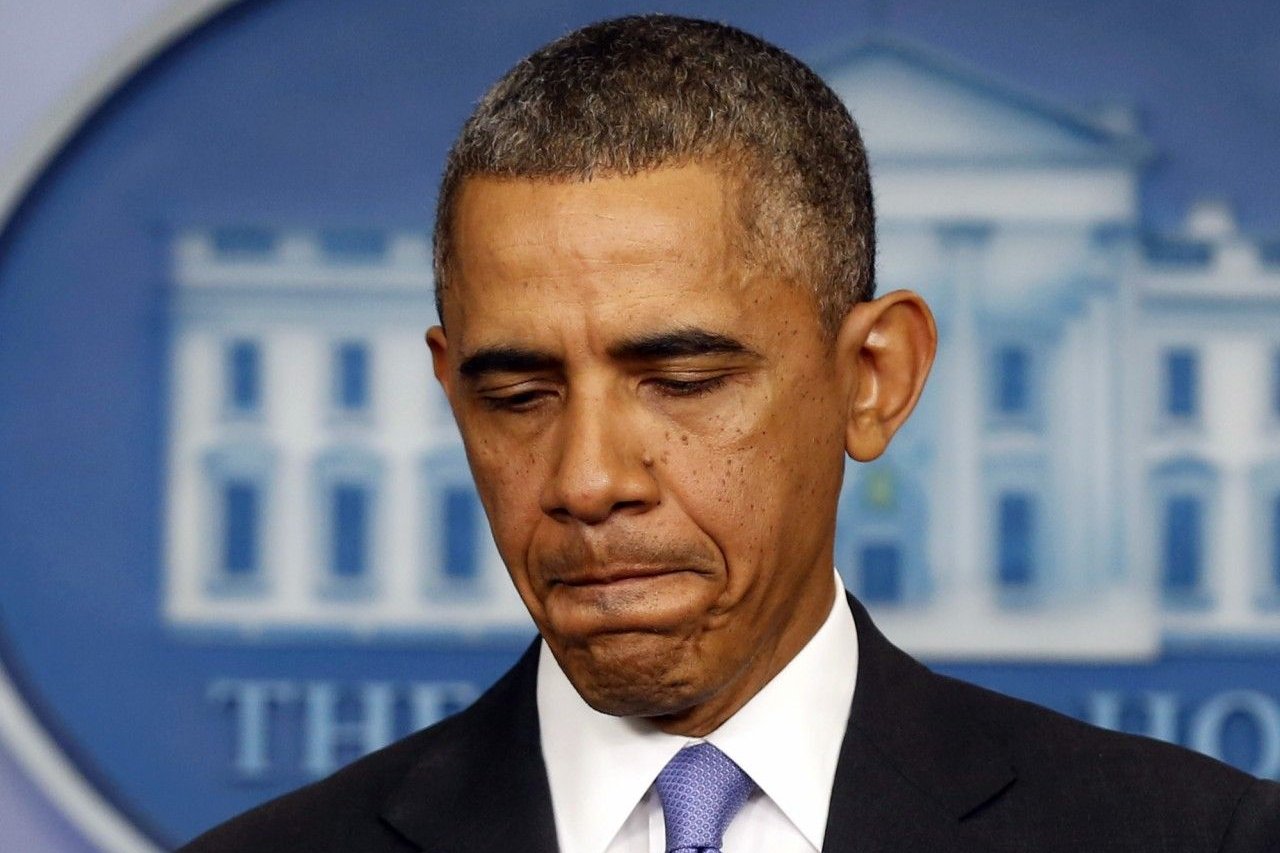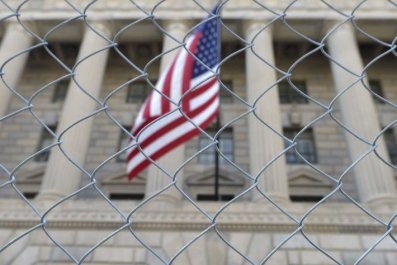On Veterans' Day, President Obama did what all presidents do: He welcomed soldiers to the White House in the morning, laid a wreath at Arlington National Cemetery in the afternoon and posed for a gazillion pictures.
But the photo-ops could hardly mask what is otherwise a presidency in free fall. With the implementation of the Affordable Care Act off to a disastrous start, and each poll registering approval levels lower than the previous, the commentators at The New York Times and Washington Post have begun to ask whether the final three years of Obama's presidency will be like this holiday: all ceremony and no substance.
So can the president turn this thing around, or is he already a lame duck? Has No-Drama Obama become No-Anything Obama?
"Obama has reached the nadir of his presidency and risks diminished relevance for the remainder of his presidency," William Galston, a former advisor to President Bill Clinton, warned on Wednesday. After sifting through the latest devastating polls numbers, he ticked off a litany of bad news for the president: His job approval is at its lowest ever at 39 percent, according to a Quinnipiac University poll. Even among his base of supporters, women disapprove of the job he is doing 51 percent to 40 percent; Hispanics disapprove 47 percent to 41 percent; and young voters disapprove 54 percent to 36 percent.
Worst of all, Obama's personal credibility is at its lowest, with 52 percent saying he is not honest and trustworthy - a finding Galston called "a dagger aimed at the heart of Obama's presidency." Throughout a tough first term, voters viewed the president favorably even if they didn't like what was happening, and that insulated him from Republican attacks and buoyed him during the 2012 election season.
Clearly, things have not been going the president's way lately. Since the spring, he has weathered the failure of gun control legislation after the Sandy Hook elementary school shooting, the trickle of National Security Agency leaks from Edward Snowden and a close brush with war in Syria. His latest judicial nominees have been filibustered. Congress is still fussing with the dying embers of comprehensive immigration reform, Obama's biggest second-term goal.
Yet these setbacks pale in comparison to the disastrous rollout of Obama's signature health-care reform law. Here, the president faces two major problems: One is the HealthCare.gov website, which has yet to work properly six weeks after being unveiled. The other is the revelation that when Obama promised Americans "if you like your plan, you can keep your plan," that wasn't entirely correct. He went on NBC to apologize, if the polls are any indication, however, the public hasn't forgiven him. Republicans are milking the confusion for all it's worth.
The president is already acting to contain the damage. In a press conference on Thursday, Obama spoke to the problems with the website and offered a policy fix for the cancelled plans that would allow insurance companies to continue to provide those policies, as long as they make consumers aware that they might be better off purchasing a new plan in the Obamacare marketplace. The president acknowledged people's frustrations and that he would have to earn back the public's trust on the issue. "We fumbled the rollout of this health care law," he said. "That's on me."
Still, if health care is bringing Obama down, fixing it could raise him up again. It is the lynchpin.
"It's all about the implementation. It's that simple," said Representative Peter Welch, D-Vt. "If several months from now, people have better coverage at lower costs and more security, then this will be just a distant memory.
"But," he added, "the longer it takes, the more difficulties there are, the steeper the political climb is."
While health-care reform - and Obama's presidency - depend on getting the health-care exchanges up and running, there are other ways to stanch the bleeding. "I think the president has to show that he's in touch, and if that means holding some people accountable, so be it," Galston said. The apology, he said, did not give the public the explanation it needs.
Apologies will only get Obama part of the way. "You can't win a political argument by playing defense," said Brad Woodhouse, a former spokesman for the Democratic National Committee, arguing that the administration should go after Republicans' opposition to Medicaid expansion, which is preventing millions of people from getting health-care coverage. "The website, the issue of cancellations, I think those have put progressives on the defense on Obamacare."
There are ways to go on offense that don't involve health care that could energize the dejected Democratic base. Obama may already be trying this strategy, recently endorsing progressives' calls to raise the minimum wage to $10 per hour.
Another possibility is the idea of Senate Democrats going, as they say in Washington-speak, "nuclear" - reforming Senate rules so that Republicans, despite being in the minority, cannot use procedural votes to block the president's nominees. After the GOP blocked two of Obama's nominees to the D.C. Circuit Court - the most important court in the country after the Supreme Court - some Democrats are calling for the nuclear option.
"Obama may have an opportunity then to mollify some of his own base by moving forward with some judicial nominations that they'll like," said Norm Ornstein, a conservative political commentator. A showdown in the Senate would take attention away from the Obamacare debacle.
That could buy Obama time, but there is no getting around the fact that he needs to de-bug Obamacare - and soon. Woodhouse likens it to the BP oil spill that lasted nearly three months in 2010. "It didn't matter so much what was said until that thing was capped and there was no more oil coming out of it," he said. "Eventually the [well] was going to be capped. Eventually the website is going to be fixed."
If Obama is looking for good omens, it's that Democrats bristle at the suggestion that he is a lame duck; it means they are not ready to throw him under the bus just yet. Representative Gerry Connolly, D-Va., took issue with idea that Obama has had a terrible year, listing a number of successes he had at the start, including two fiscal deals, passage of the Violence Against Women Act and an aid package for victims of Hurricane Sandy. "He's having a little bit of difficulty unrolling his legacy legislation, but it's hardly the end of the world," he said. "Presidents have ups and downs."
There's a good bit of finger-wagging at the media, too. "It's too early for obituaries," said Senator Tom Harkin, D-Iowa. "You've got to feed this 24-hour news cycle, and it's got to be something exciting and contentious."
They have a point. Politics is a fast-moving game, with almost unpredictable ups and downs. "There are things that can happen that can turn this around," Ornstein said. It's possible, for example, that the current budget negotiations in Congress could render a popular deal; it's possible the economy could grow stronger - especially if a budget deal eased the sequester spending cuts; there could be some foreign policy achievements on the horizon. And then there's the possibility that Republicans could turn the media's spotlight back on them by forcing another government shutdown. "If there's one thing you can set your watch by in Washington, D.C., it's that Republicans will overplay their hand," Woodhouse said.
There is also a hint of injustice in writing off Obama's presidency already since his approval rating - high or low - has never had more than a small effect on Congress. Even with the full weight of his 2008 mandate behind him, for example, not a single Republican voted for health-care reform. Ninety percent of Americans supported universal background checks for gun ownership, but the bill still failed. "If the president had a 65 percent approval right now, it's not going to have an impact on House Republicans' strategy about whether they will bring up a comprehensive immigration bill," Ornstein said. "The impact there is only on the margins."
Nevertheless, the stakes for Obama over the next few months are high. His poll numbers themselves may not move mountains, but they are essential to what has been his greatest legislative advantage: party unity. "Your own party members who are up in the midterm elections grow more and more nervous about being identified with you, and they begin to vote in ways that undermine your policies," Ornstein said.
"We don't know where this will go," he added. "What matters is getting the Affordable Care Act up and running right now."
























